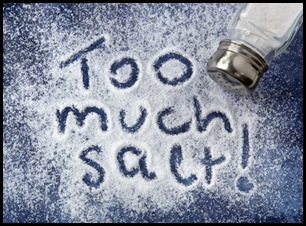by Kazeem Olalekan MRPhamS
 When you read this headline in the Daily Express: Now Salt is safe to eat, you will be forgiven for thinking that the time is right to get out the salt shaker and shake, shake, shake, Senora, shake it all the time. In fact the NHS advice of adult salt intake limit of 6g a day remain unchanged. This is the kind of headline that adds salt to my professional injury!
When you read this headline in the Daily Express: Now Salt is safe to eat, you will be forgiven for thinking that the time is right to get out the salt shaker and shake, shake, shake, Senora, shake it all the time. In fact the NHS advice of adult salt intake limit of 6g a day remain unchanged. This is the kind of headline that adds salt to my professional injury!
Looking behind the headline (a very sensible thing to do in these cases), this is a result of a recently published systematic review and meta-analysis of randomised controlled trial published in peer-reviewed American Journal of Hypertension1. Whilst the authors did not find any strong evidence that a restricted diet reduced death due to any causes, or reduced number of cardiovascular disease events in people with normal or high blood pressure, they could place little confidence in those measurements due to relatively small number of events observed (study pooled ~6,500 patients but participant that would be needed to provide clarity is estimated to be at least 18,000).
Key results for me are:
- The researchers also say that the observed reductions in blood pressure (between 1 and 4 mm Hg) would, according to current risk models, generally predict a reduction in death due to CVD by 5% to 20%.
- Evidence for an increase in the number of deaths (from any cause) in the intervention group in a single trial looking at people with heart failure, who had either normal or high blood pressure.
How will this affect my practice?
- I will continue to recommend reduced intake of salt limited to 6g a day in adults.
- I will not recommend significant salt intake variation in patients with diagnosed heart failure without referral to the GP or appropriate specialist.
1Taylor RS, Ashton KE, Moxham T et al. Reduced Dietary Salt for the Prevention of Cardiovascular Disease: A Meta-Analysis of Randomized Controlled Trials (Cochrane Review). American Journal of Hypertension, 2011 [Awaiting publication]






Leave a Reply